Tips for Students Planning an RV Trip on a College Budget
Wander With Wonder - Discovering Wow Moments Around the World or Across the Street
Read the article to discover money-saving tips for college students planning an epic RV adventure without breaking the bank.
As a college student, finding affordable ways to travel and explore can be a challenge. However, an RV trip can be an excellent option for those seeking adventure on a budget. Renting or purchasing a used RV and hitting the open road offers freedom, flexibility, and cost-effectiveness. This article explores tips to help you plan an unforgettable RV trip without breaking the bank. For students planning an RV trip on a college budget, seeking expert assistance to write an essay for me ensures they can effectively organize their travel plans and budget, maximizing the adventure while minimizing stress and uncertainties.
Budgeting and Cost Considerations
Several budgeting considerations can help you plan an RV trip on a budget.
- Set a Realistic Budget. Before embarking on your RV adventure, it’s crucial to establish a realistic budget for RV travel. Consider your available funds, desired trip duration, and essential expenses such as fuel, campground fees, food, and potential repairs.
- Rent or Buy a Used RV. Renting an RV can be a cost-effective option, especially for shorter trips. However, if you plan to take multiple trips or prefer the convenience of owning an RV, consider purchasing a used model. Thoroughly inspect any used RV before purchasing to ensure it’s in good condition.
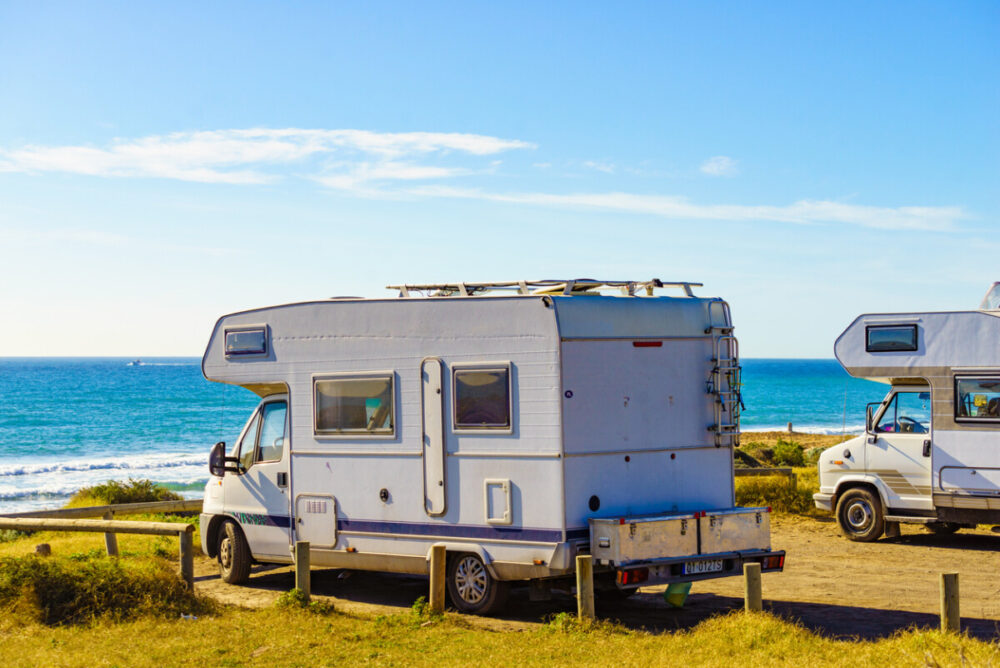
Rent or purchase a used RV before making a huge commitment. Photo by Anetlanda via iStock by Getty Images
- Fuel Costs. Fuel is one of the most significant expenses when traveling by RV. Research fuel-efficient models and plan your route strategically to minimize unnecessary mileage. Apps like GasBuddy can help you find the cheapest gas prices along your route.
- Camping Costs. Opt for public campgrounds, national forests, or Bureau of Land Management (BLM) lands, often offering affordable or free camping options. Dispersed camping on public lands, also called boondocking, can be a budget-friendly alternative to traditional campsites.
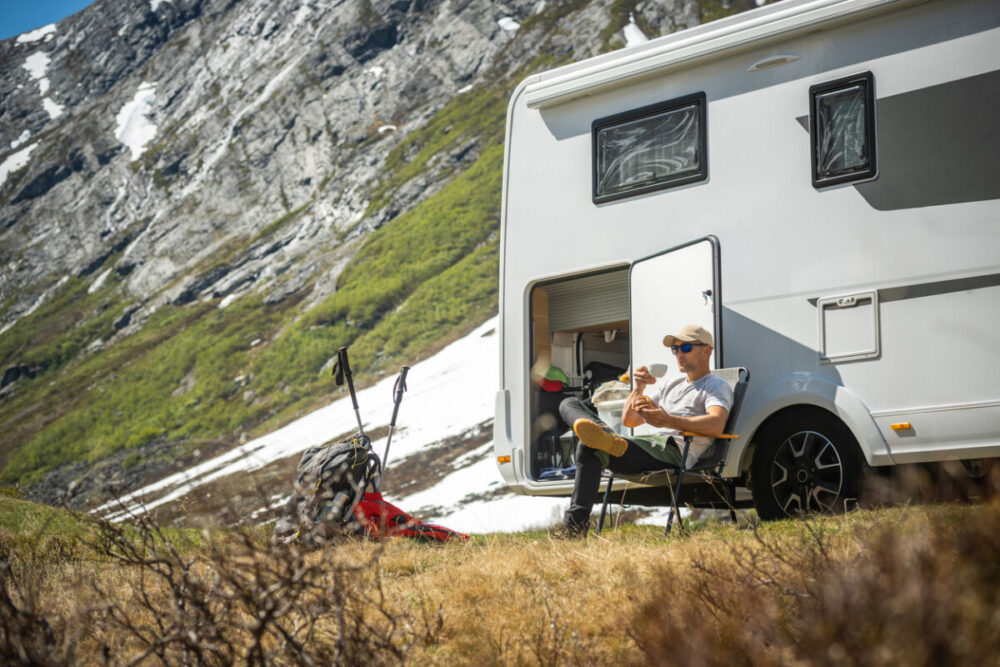
A great way to travel in your RV on a budget is to stay on public lands. Photo by welcomia via iStock by Getty Images
- Meal Planning and Cooking. Equip your RV with a basic kitchen setup and stock up on non-perishable items and easy-to-prepare meals. Cooking your own meals in the RV can save you a lot of money compared to eating out.
Route Planning and Budgeting for Activities
When planning an RV trip on a college budget, utilizing helpful resources like https://www.jpost.com/special-content/best-essay-writing-services-top-8-paper-writing-websites-778969 empowers students to efficiently manage their expenses while enjoying a memorable and budget-friendly adventure on the road. Here are other route planning considerations.

While planning, think about what you’ll need and what you can get at your destination. Photo by Halfpoint via iStock by Getty Images
- Research Free Activities. Before starting your trip, research free or low-cost activities along your planned route. Many national and state parks offer free entry or discounted student rates. Hiking, exploring small towns, and visiting roadside attractions can be inexpensive ways to experience new places.
- Leverage Student Discounts. Remember to take advantage of student discounts wherever possible. Many attractions, museums, and campgrounds offer reduced rates for college students with valid IDs.
- Work Exchange Programs. Consider participating in work exchange programs like Workaway or WWOOFing (World Wide Opportunities on Organic Farms). These programs allow you to exchange labor for accommodation and sometimes meals, providing a unique way to stretch your budget while experiencing different lifestyles.
- Travel During Off-Peak Seasons. Traveling during the off-peak seasons can often yield lower prices for campgrounds, attractions, and fuel. Shoulder seasons, such as early spring or late fall, can be ideal for avoiding crowds and saving money.
Maintenance and Repairs
Yes, you must understand maintenance and repairs before heading out on your RV trip. Here are some money-saving tips.
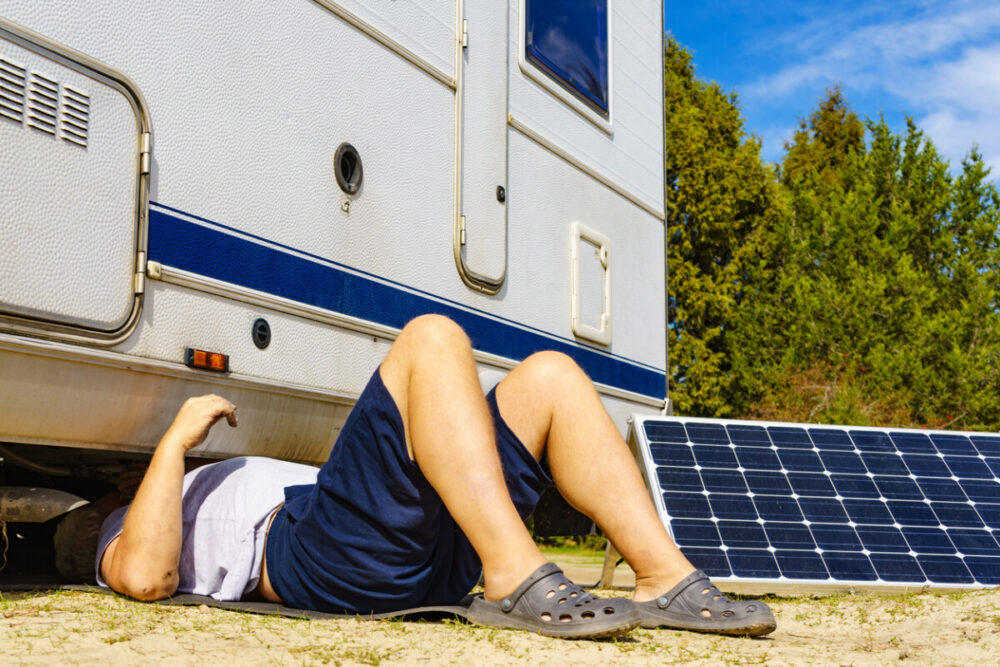
Learning basic RV repairs can help you stick to a budget. Photo by Voyagerix via iStock by Getty Images
- Learn Basic RV Maintenance. Familiarizing yourself with essential RV maintenance can save you money on repairs and extend the lifespan of your vehicle. Learn how to perform routine checks on fluid levels, tires, and appliances to catch potential issues early.
- Invest in a Tool Kit and Spare Parts. A well-stocked tool kit and carrying spare parts for common repairs can prevent costly roadside assistance or towing fees. Research your specific RV model’s most common repair needs and stock up on essential items.
- Join RV Clubs or Forums. Joining RV clubs or online forums can provide access to valuable resources, advice, and discounts on parts and services. These communities can also help you find trusted mechanics or mobile repair services along your route.
Packing and Supplies
It’s essential to avoid overpacking an RV, but having enough of the basics is vital so you won’t be forced to purchase costly items on the road. Here are packing tips to help you stay within budget.
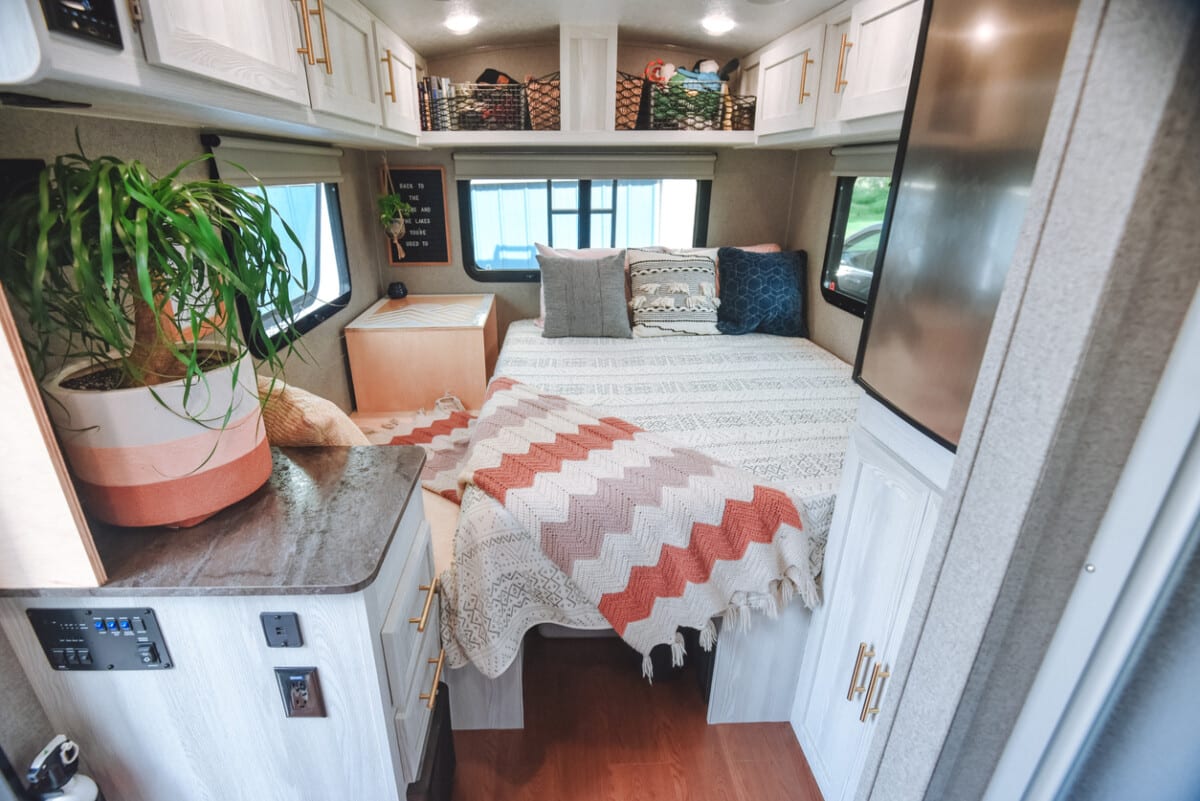
With some planning, you can create a comfortable, organized space in your RV or fifth-wheel trailer. Photo by Alisha Bube via iStock by Getty Images
- Pack Light and Minimalistic. Remember that every pound you carry in your RV impacts fuel efficiency. Pack only the essentials and opt for lightweight, multi-purpose items to minimize weight and maximize space.
- Invest in Reusable Supplies. Reusable water bottles, shopping bags, and food containers can help reduce waste and save money in the long run. Look for durable, eco-friendly options that can withstand the rigors of RV life.
- Embrace Minimalism. Embrace the minimalist lifestyle while on the road. Focus on experiences over possessions, and resist the temptation to accumulate unnecessary items during your travels.
Entertainment and Connectivity
You’ll want to stay connected while on the road in your RV for various reasons. From using GPS to answering emails, posting on social media to watching movies, you’ll want to remain connected. Fortunately, there are some budget-sensitive ways to stay connected on the road.
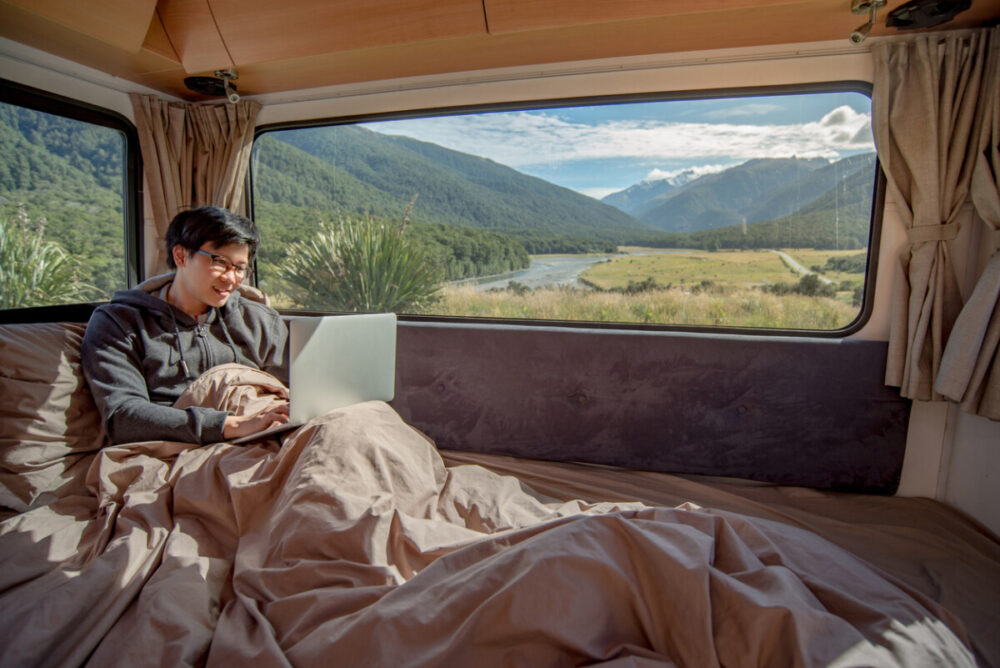
You will want to stay connected even while on the road in your RV. Photo by Zephyr18 via iStock by Getty Images
- Free Entertainment Options. Traveling by RV offers endless opportunities for free entertainment. Hiking, stargazing, playing outdoor games, and exploring new destinations can provide hours of enjoyment without spending a dime.
- Take Advantage of Free Wi-Fi. While disconnecting from the digital world can be refreshing, access to Wi-Fi can be essential for researching destinations, updating travel plans, and staying connected with loved ones. Seek out free Wi-Fi hotspots at public libraries, coffee shops, or campgrounds to save on data costs.
- Embrace Offline Entertainment. Load up your devices with movies, music, podcasts, and e-books before hitting the road. This way, you’ll have plenty of entertainment options without relying on internet connectivity or incurring additional costs.
Safety and Emergency Preparedness
When you set out on your RV road trip, you must be prepared for emergencies. Safety on the road is essential. Here are tips to ensure safety and emergency preparedness while sticking to your budget.
- Emergency Fund. Set aside a dedicated emergency fund to cover unexpected repairs, medical expenses, or other unforeseen circumstances that may arise during your trip. This fund can provide peace of mind and prevent you from going into debt.
- Travel Insurance. Consider purchasing travel insurance to protect yourself against trip cancellations, medical emergencies, or lost/stolen belongings. While it may seem like an added expense, it can save you from significant financial burdens in case of emergencies.
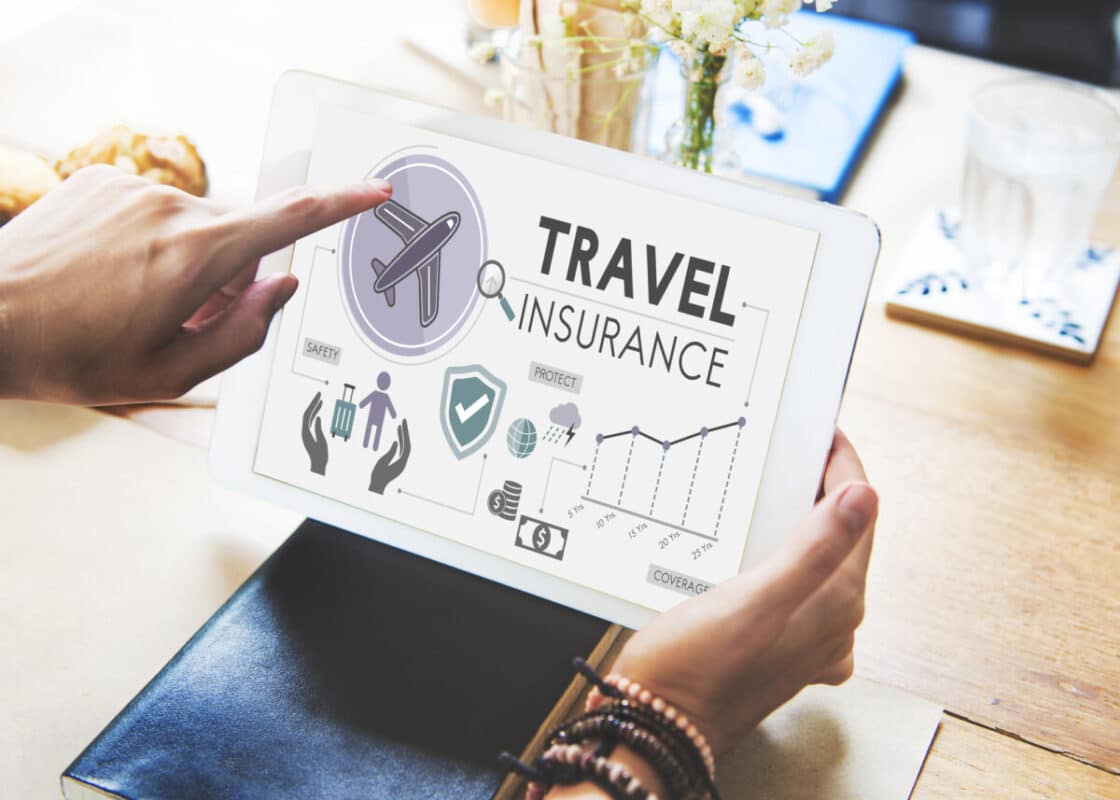
Examine the pros and cons of purchasing travel insurance. Photo by Rawpixel via DepositPhotos
- First Aid and Safety Supplies. Pack a well-stocked first aid kit and essential safety supplies, such as fire extinguishers, flashlights, and emergency signaling devices. Familiarize yourself with their use and storage to ensure you’re prepared for any situation.
Articles Related to Planning a Budget RV Trip
- Best Coolers for Road Trips in 2024
- How to Enjoy Slow Travel
- Top Tools and Supplies You Need to Outfit Your RV
Enjoying Your Budget-Friendly RV Trip
Following these tips lets you go on an unforgettable RV adventure without compromising your college budget. Remember, the key to a successful and affordable RV trip lies in careful planning, resourcefulness, and a willingness to embrace the minimalist lifestyle on the road. Embrace the freedom and flexibility of RV travel while creating lasting memories and experiences that will stay with you long after graduation. We invite you to explore Wander With Wonder for more of our favorite RV tips and destinations.
The post Tips for Students Planning an RV Trip on a College Budget appeared first on Wander With Wonder.



